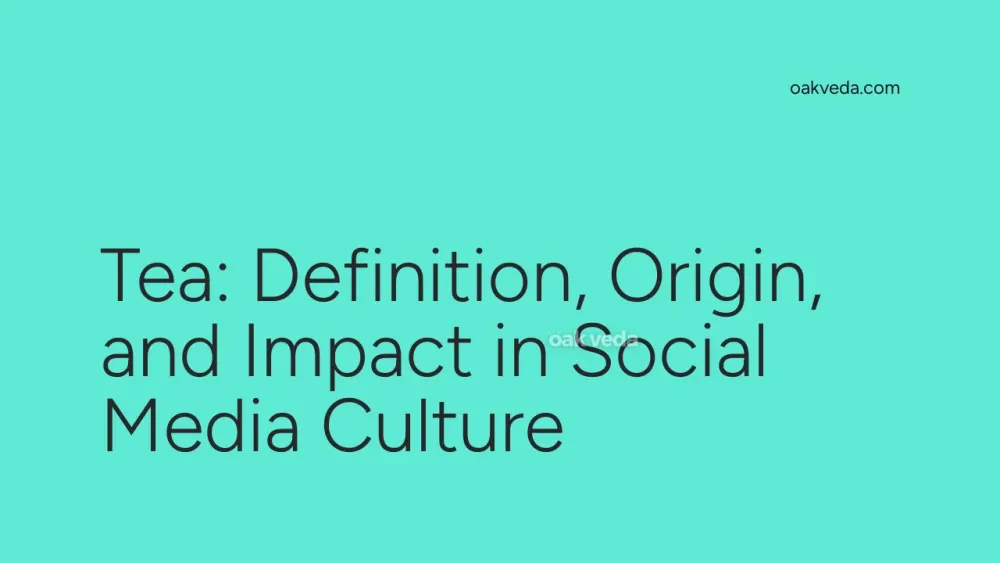
What is "Tea" in Social Media?
In the world of social media, "tea" isn't just a hot beverage. It's a slang term that has taken the digital landscape by storm, referring to juicy gossip, drama, or insider information. When someone says they're "spilling the tea," they're about to share some exciting or scandalous news. This term has become an integral part of online communication, particularly among younger generations and social media enthusiasts.
Origin and Development of "Tea"
The origins of "tea" as slang can be traced back to African American Vernacular English (AAVE) and the LGBTQ+ community. While its exact origin is debated, the term gained popularity in drag and ball culture during the 1980s and 1990s. Over time, it spread to wider African American communities and eventually made its way into mainstream pop culture and social media.
One theory suggests that "tea" is an acronym for "Truth, Enlightenment, and Awareness." Another proposes that it's derived from the phrase "spill the beans," with "tea" replacing "beans" as a more sophisticated alternative. Regardless of its exact origin, the term has evolved to become a ubiquitous part of online discourse.
How "Tea" Works in Social Media
On social media platforms, "tea" functions as a versatile term used in various contexts:
- Sharing gossip: Users often use phrases like "spill the tea" or "what's the tea?" to prompt others to share juicy information.
- Reacting to drama: When a celebrity scandal breaks, you might see comments like "This tea is hot!" or "I'm here for this tea."
- Teasing information: Influencers might say, "I've got some tea to share later," to build anticipation for upcoming content.
- Discussing current events: People may use "tea" to refer to the latest news or trending topics.
Popular Examples of "Tea" in Social Media
The use of "tea" has become widespread across various social media platforms:
- Twitter: Users often use the tea emoji (🍵) or phrases like "Spill the tea, sis" to encourage others to share gossip.
- TikTok: Content creators use hashtags like #TeaTime or #SpillTheTea for videos discussing celebrity drama or personal stories.
- Instagram: Gossip accounts might use "tea" in their names or captions, like "Hollywood Tea" or "This week's hottest tea!"
- YouTube: Many channels have dedicated "tea" series where they discuss the latest drama in their niche.
Impact of "Tea" on Social Media Culture
The prevalence of "tea" in social media has significantly impacted online culture:
- Encourages engagement: The promise of "tea" often drives likes, comments, and shares as users eagerly participate in discussions.
- Creates community: Sharing and discussing "tea" fosters a sense of belonging among users with similar interests.
- Influences content creation: Many influencers and brands now structure their content around "spilling tea" to attract viewers.
- Affects language: The term has influenced how people communicate online, with many incorporating it into their everyday digital vocabulary.
Controversies Surrounding "Tea"
While "tea" has become a popular term, it's not without controversy:
- Cultural appropriation: Some argue that the mainstream adoption of "tea" from AAVE and LGBTQ+ communities is a form of cultural appropriation.
- Promotion of gossip: Critics suggest that the "tea" culture encourages spreading rumors and invading privacy.
- Misinformation: The desire for hot "tea" can sometimes lead to the spread of unverified information or fake news.
How Brands and Influencers Use "Tea"
Savvy brands and influencers have incorporated "tea" into their social media strategies:
- Content series: Many create regular "tea time" segments to discuss industry news or behind-the-scenes information.
- Engagement tactics: Brands might use phrases like "We've got some tea to spill" to tease product launches or announcements.
- Collaborations: Influencers often collaborate on "tea-spilling" sessions to cross-promote their content.
- Merchandise: Some have capitalized on the trend by creating "tea"-themed products or merchandise.
Future Trends Related to "Tea"
As social media continues to evolve, so too will the use of "tea":
- Platform-specific features: Social media platforms might introduce "tea"-themed features or filters.
- Evolution of meaning: The term may continue to evolve, potentially taking on new connotations or uses.
- Integration with AI: As AI becomes more prevalent in social media, we might see "tea"-generating algorithms or chatbots.
- Global adoption: While primarily used in English-speaking communities, "tea" may spread to other languages and cultures.
FAQs about "Tea" in Social Media
-
Is "tea" only used for celebrity gossip? No, "tea" can refer to any type of gossip or insider information, whether it's about celebrities, personal lives, or even workplace drama.
-
How do you use "tea" in a sentence? Examples include: "What's the tea on their breakup?" or "I've got some hot tea about the company merger."
-
Is using "tea" appropriate in professional settings? It's generally best to avoid using slang like "tea" in formal or professional contexts, as it may be seen as unprofessional.
-
Can "tea" be used positively? While often associated with drama, "tea" can also be used for positive news or exciting developments.
-
How has "tea" impacted online privacy? The culture of "spilling tea" has raised concerns about privacy, as people may feel pressured to share personal information for engagement.
In conclusion, "tea" has become a powerful force in shaping social media discourse and engagement. As it continues to evolve, its impact on digital culture and communication will undoubtedly remain significant. Whether you're a casual social media user or a digital marketing professional, understanding the nuances of "tea" is crucial for navigating the ever-changing landscape of online interaction.
You may be interested in:
- Social Media Manager: Definition, Origin, and Impact
- That Girl: Definition, Origin, and Impact on Social Media
- "It's Whackadoodle Time": Definition, Origin, and Impact
- Dark Social: Definition, Origin, and Impact on Digital Marketing
- TBF: Definition, Origin, and Impact on Social Media
- GRWM: Definition, Origin, and Impact on Social Media

